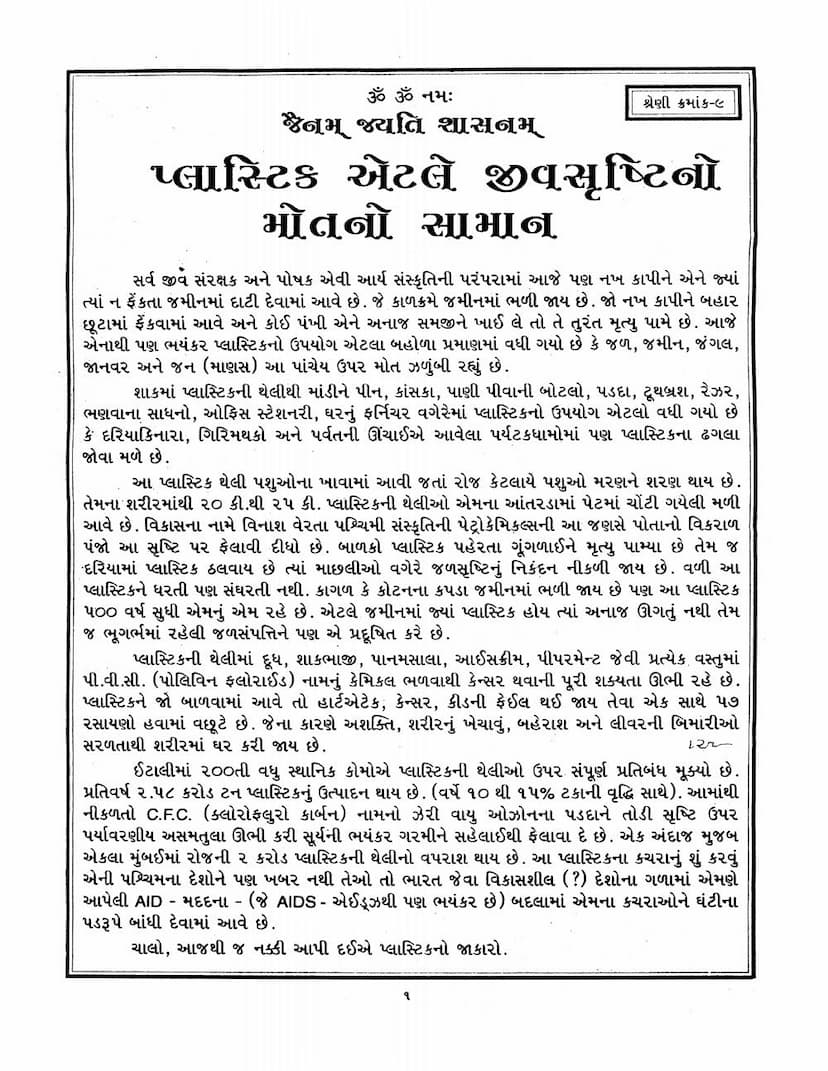Viniyog Parivar Dwara Prakashit Lekh Samput
Added to library: September 2, 2025

Summary
This extensive Jain text, "Viniyog Parivar Dwara Prakashit Lekh Samput," published by Viniyog Parivar, is a compilation of various articles and teachings aimed at spiritual and ethical upliftment within the Jain tradition. The text covers a wide range of topics, from environmental consciousness to personal conduct and devotional practices. Here's a comprehensive summary of its key themes and messages:
1. Environmental Protection and Ahimsa (Non-violence):
- Plastic as a Danger: The text strongly condemns the use of plastic, likening it to "death for living beings." It highlights how plastic pollutes water, land, forests, animals, and humans, persisting for hundreds of years and causing harm to wildlife. It advocates for a return to eco-friendly practices, like using cloth bags.
- Broader Environmental Care: The emphasis on non-violence extends beyond plastic to protecting all forms of life. The tradition of burying nail clippings instead of discarding them highlights a deep respect for all living beings and the environment.
2. Health and Well-being (Ayurveda and Traditional Practices):
- Natural Remedies: A significant portion of the text is dedicated to providing natural remedies for common ailments, particularly diarrhea and hair loss. These remedies often involve simple ingredients like ginger, yogurt, fenugreek, cumin, gooseberry, and neem.
- Dietary Advice: The text offers guidance on healthy eating habits, emphasizing the importance of consuming light food, avoiding fried and spicy items during illness, and the adverse effects of drinking water immediately after meals, especially during Chovihar (fasting).
- Hygiene and Cleanliness: Practical advice on bathing, using soap (or natural alternatives like fuller's earth), and maintaining cleanliness is provided, linking it to spiritual purity.
- Holistic Health: The text suggests that physical health is intertwined with mental and spiritual well-being, advocating for balanced living.
3. Ethical Conduct and Personal Development:
- Identifying Foolishness: A substantial section provides a list of 100 characteristics of a "fool" (murkha), taken from a Jain scripture, Shraddhavidhi Prakaran. This serves as a self-assessment tool, encouraging readers to identify and avoid such traits to cultivate wisdom.
- Importance of Right Intention (Bhav): The text stresses that true devotion and spiritual progress stem from the right intention (Bhav) rather than just outward rituals. It emphasizes the power of heartfelt devotion to achieve spiritual goals.
- Self-Improvement: The "Today's Thought" sections offer concise philosophical insights on self-reflection, acceptance of suffering, the importance of good company (Satsang), and personal transformation.
- Ethical Behavior in Daily Life: Various sections subtly weave in principles of ethical conduct, such as avoiding gossip, being mindful of one's actions, and showing respect.
4. Devotional Practices and Jain Philosophy:
- The Significance of Devotion (Bhakti): The text elaborates on the profound importance of devotion (Bhakti) as a path to liberation (Mukti). It highlights the teachings of Upadhyay Shri Yashovijayji Maharaj, who emphasized devotion as a means to attain the highest spiritual state.
- The Power of Jain Idols (Pratimas): The text explains the spiritual significance of Jain idols (Pratimas), viewing them not merely as stone but as embodiments of the divine. It discusses the anjanshalaka ritual and the belief that worshipping these idols allows divine qualities to permeate the devotee.
- Detailed Puja Rituals: A significant portion of the text is dedicated to the "Mysteries of Ashtaprakari Puja" (Eightfold Worship), providing intricate details on the proper performance of various rituals, including the use of water, sandalwood, flowers, incense, lamps, rice, offerings, and the symbolic gestures involved. It emphasizes the spiritual fruits derived from each aspect of the worship.
- The Three Pillars of Jainism: The text repeatedly refers to the importance of Bhavna (meditation/contemplation), Kriya (action/rituals), and Namaskar Mahamantra as essential components of spiritual practice.
- Ahimsa in Action: The text highlights the Jain commitment to non-violence through various examples and injunctions, such as avoiding specific vegetables (Anantkay), being mindful of microscopic life in water and food, and the broader concept of Amari (renunciation of meat consumption).
- The Importance of the Gurus: The teachings of revered Jain monks and scholars like Upadhyay Shri Yashovijayji Maharaj and Muni Shri Chandrashekhar Vijayji Maharaj are presented as guiding lights.
- The Value of Rituals: The text underlines the significance of observing rituals correctly, emphasizing the internal intention (Bhav) behind each action. It connects correct ritualistic performance to spiritual merit and eventual liberation.
5. Social Commentary and Concerns:
- Westernization and Cultural Erosion: The text expresses concern about the Westernization of Indian culture, particularly in how festivals like Navratri have become commercialized and lost their traditional spiritual essence. It laments the erosion of traditional values, family structures, and respect for elders due to the influence of Western media and consumerism.
- Critique of Modern Development: The text criticizes the Western model of development, which it argues is based on violence and exploitation, leading to environmental degradation and the neglect of traditional Indian knowledge systems.
- Call to Action and Awareness: Throughout the text, there are calls for readers to be more conscious of their actions, to adopt Jain principles in their daily lives, and to spread awareness about these vital issues.
- The Power of Collective Action: The text stresses that addressing the challenges posed by negative external influences requires organized and collective effort within the Jain community.
Overall Tone and Purpose:
The "Viniyog Parivar Dwara Prakashit Lekh Samput" serves as a comprehensive guide and a call to action for Jains and anyone interested in spiritual living. It aims to educate, inspire, and motivate readers to live a life of adherence to Jain principles, emphasizing a harmonious blend of spiritual devotion, ethical conduct, health consciousness, and environmental responsibility. The compilation reflects a deep commitment to preserving and propagating the core values of Jainism in contemporary society.